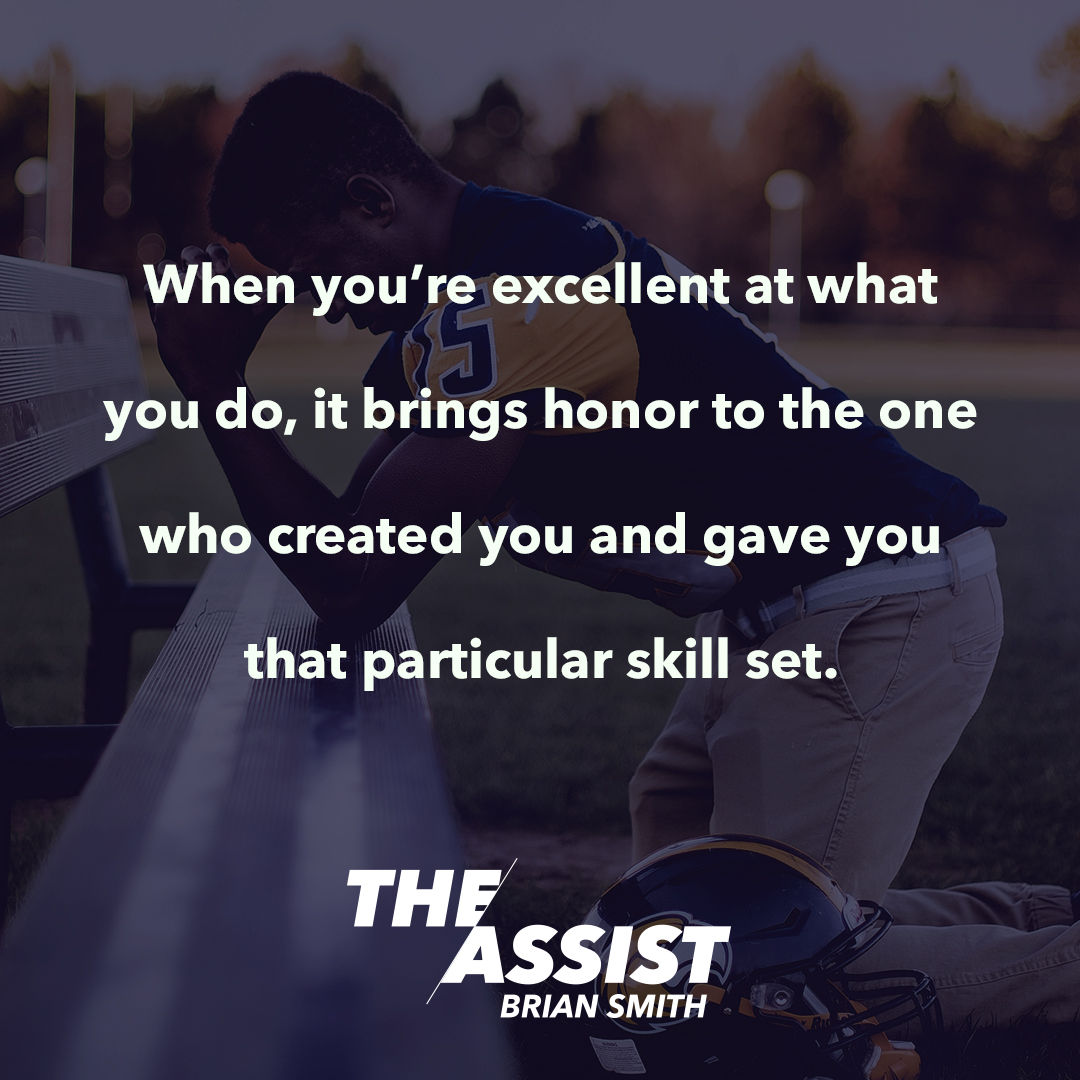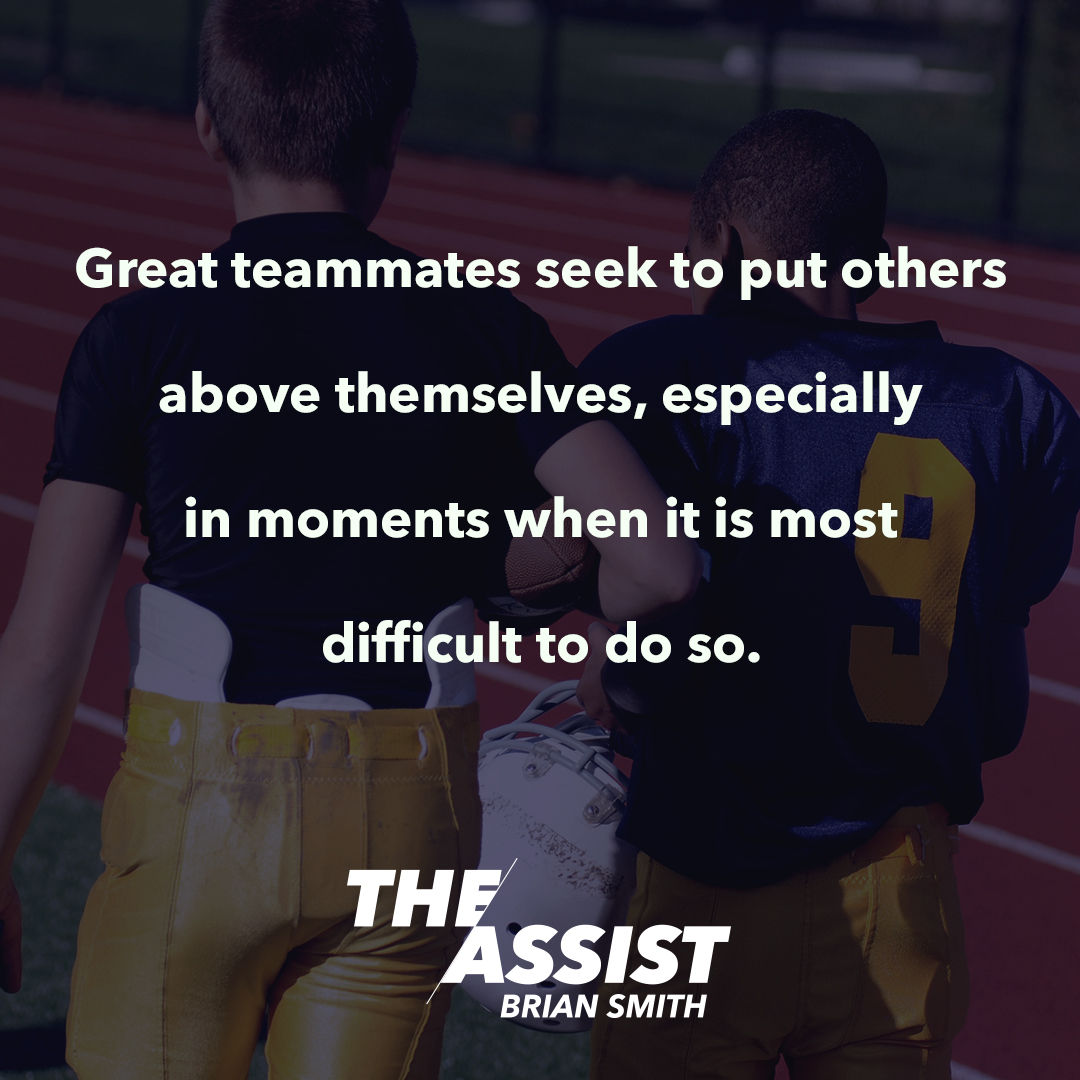A few months ago my book, The Assist: A Gospel-Centered Guide to Glorifying God Through Sports, hit the bookstores. Below are select quotes from each chapter. In my opinion, these quotes best represent what the book is all about. If you are into Cliff notes instead of reading the whole book, this summary is for you. To gain access to the study guide, scripture reference sheet, or more information about the book in general, visit theassistbook.com.
Introduction
The word “glory” has turned into a buzzword we flippantly toss around because it is the right answer. But how many of us know what it means?
We need to learn and execute on making our sport serve us in a way that draws us closer to God.
When we use our sport to get more of God, we are aligning ourselves with the way God intended his good gifts, like sports, to work.
Chapter 1 - Glory
What God desires most is his glory. As John Piper says, “God has many other goals in what he does. But none of them is more ultimate than this.”
Glory simply means weight.
God’s glory is, at least, the weight of everything that makes him God and the “going public” of that weight for others to notice.
Giving God glory means thinking and acting in a way that pleases him and draws attention to who he is.
Chapter 2 - God
God is not indifferent to anything that takes place within his universe, which includes how you play and think about your sport.
The gospel shows us that God is pleased with us, not because of anything we do or did, but because of what Jesus has already done for us.
By choosing to give God his due only after our athletic successes, we reinforce the stereotype of God being like a fan, coach, or owner who is only interested in wins and losses.
We must view God through the lens he wants to be viewed through—as our Father.
Chapter 3 - Athletes
Having a proper view of ourselves aids in the fight against pride.
Humility is like a muscle—it gets stronger when pushed. That is, we practice humility, seeking the low place of service rather than self-promotion.

Chapter 4 - Motivation
We often wrongly believe Philippians 4:13 means we can achieve any outcome in our sport because of Christ.
Philippians 4:13, in its proper context, means that we can have contentment regardless of the outcome because of Christ.
A focal point is something you can quickly concentrate on that realigns your focus on your ultimate motivation in your sport: glorifying God.
Chapter 5 - Winning
Celebrating good things that happen is not evidence of a lack of humility; it is part of how God designed us to react.
Winning is great, and we should desire to pursue it, but there is a good reason why it does not satisfy you at a soul level. It was never supposed to.
Don’t relegate “giving your best” to game day performances. Don’t be habitually lazy in practice, in the weight room, and with your eating and sleeping habits, and then give it 100 percent during competition and claim, “All glory to God!”
Go ahead and pray for the win.
Accept praise humbly and graciously.

Chapter 6 - Losing
It’s alright to be frustrated when you lose. You’re human. Don’t fake a positive emotion to appear Godly.
When a Christian athlete loses and still makes much of Jesus, non-Christians notice and often want to know more from that athlete. Anyone can make much of Jesus after a win.
Our obedience should be birthed out of a desire to please our heavenly Father, not out of a misguided belief that our “goodness” can be exchanged for an earthly blessing like athletic success. God is not a genie.
Chapter 7 - Injuries
Be honest with God about how you are feeling; he can handle it.
God may be preparing you for something in the future through your current circumstance.
God may want you to deal with something in the present, and your injury is the “pause” you need to focus.
You may be injured because God wants to use you to reach someone else.
Chapter 8 - Practice
For the Christian athlete, practice should primarily be about others, not yourself.
Your motivation in practice should be to engage in it as if you were doing it for the Lord.
Relationships will always have more lasting value and joy than the trophies you earn.
God has designed our body in such a way that when we exercise, we experience increased happiness (endorphins, etc.).
Chapter 9 - Teammates
Despite unfortunate circumstances, Jonathan chose to act as a faithful friend instead of complaining.
Great teammates do not lurk behind the scenes looking for an opportunity to capitalize on the misfortune of others.
Your most significant impact as an athlete may be on the teammates who you rub shoulders with every day.

Chapter 10 - Gray Areas
God stared into the face of chaos and created order. What does this look like in sports? Simply put, we follow the rules of the game.
When we choose to operate with integrity in every way possible, we image our Creator.
Doing the right thing doesn't mean you'll come out on top of the scoreboard.
Athletes who take a hard line on gray areas are susceptible to becoming prideful or at least being seen as prideful. Be aware of what is going on in your heart and aware of how others might see you. Keep in mind that if you follow all the rules, obeying the letter of the law, so to speak, but it creates pride in you, you are still sinning. Attitude counts too.
Chapter 11 - Retirement
Moving on from your athletic career often involves a grieving process. It can be hard. That’s a natural reaction to losing something and should be expected.
The ups and downs of sports can set a standard of excitement that makes the next stage of our life feel comparatively dull.
Many of the same things you enjoyed in your sport can be found and experienced through involvement in the local church.
Chapter 12 - Coaches
It's our job as God's lights in this dark world to submit, smile, and display the life and love of Jesus in harsh and unfair situations.
You can avoid a lot of disappointment if you release any unrealistic expectations you may have placed on your coach.
When you show the desire to be a continual learner, you honor your coach as the teacher—and glorify God.
Christian athletes are called to stand out from the crowd, to look different. Resist the urge to gossip about your coach.
Chapter 13 - Mission
To be an effective spiritual leader on your team, you need to learn how to articulate the gospel and how to articulate your story.
The best way to change the culture on your team is to create a new culture.
A team Bible study can be one of the most effective ways you can create a new culture on your team.
Chapter 14 - Platform
Your platform does not automatically make you an effective ambassador for Christ. It just means you have people’s attention.
If you have veteran status on the team—and if you don’t now, you will someday—you have a platform to speak words of life into younger athletes on the team.
Opportunities to leverage your platform will rarely fall into your lap. They must be sought out.
Use your social media to strategically engage your followers. Remember, they chose to follow you, so don’t be afraid to be bold.













